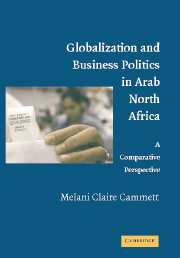Book contents
- Frontmatter
- Contents
- List of Tables and Figures
- Acknowledgments
- List of Abbreviations
- Map of Morocco
- Map of Tunisia
- I THE FRAMEWORK
- II THE INSTITUTIONAL CONTEXT
- III GLOBALIZATION AND INSTITUTIONAL CHANGE
- Appendix A Methodological Note and List of Interviewees
- Appendix B Standardized Questionnaire for Textile and Apparel Industrialists and Factory Managers
- Bibliography
- Index
Appendix A - Methodological Note and List of Interviewees
Published online by Cambridge University Press: 23 December 2009
- Frontmatter
- Contents
- List of Tables and Figures
- Acknowledgments
- List of Abbreviations
- Map of Morocco
- Map of Tunisia
- I THE FRAMEWORK
- II THE INSTITUTIONAL CONTEXT
- III GLOBALIZATION AND INSTITUTIONAL CHANGE
- Appendix A Methodological Note and List of Interviewees
- Appendix B Standardized Questionnaire for Textile and Apparel Industrialists and Factory Managers
- Bibliography
- Index
Summary
DATA COLLECTION
The bulk of the data for this book was collected during 18 months of field research in Morocco and Tunisia conducted in Spring 1998 and 1999–2000. During these extended field visits, I carried out semistructured interviews based on a uniform set of questions in either French or Arabic with over 200 firm owners and managers, business association officials, government officials, labor union leaders and shopfloor representatives, technical support agency representatives, journalists, and academics. Content analysis of these interviews constituted a key source of data. Archival research on documentation from government agencies and ministries, local research centers and libraries, and the economic press in each country also provided crucial sources of information, supplementing and corroborating the data gathered through interviews.
SAMPLING OF INTERVIEWEES
The perceived sensitivity of my research questions at times posed obstacles to the research process and prevented random selection of interviewees. Informants were frequently suspicious of my intentions and unwilling to meet with me without a personal referral from a trusted associate. Access to industrialists was often regulated by governmental and quasi-governmental bodies or producer associations, which tend to direct researchers to more successful firms or relatively uncritical supporters of state policies. By necessity, establishing contacts with informants outside of these channels relied on personal contacts and “snowball sampling,” which led to biases in sampling procedures (Biernacki and Waldorf 1981). In some instances, technical factors, such as poor accounting records, also complicated data collection.
- Type
- Chapter
- Information
- Globalization and Business Politics in Arab North AfricaA Comparative Perspective, pp. 219 - 228Publisher: Cambridge University PressPrint publication year: 2007



